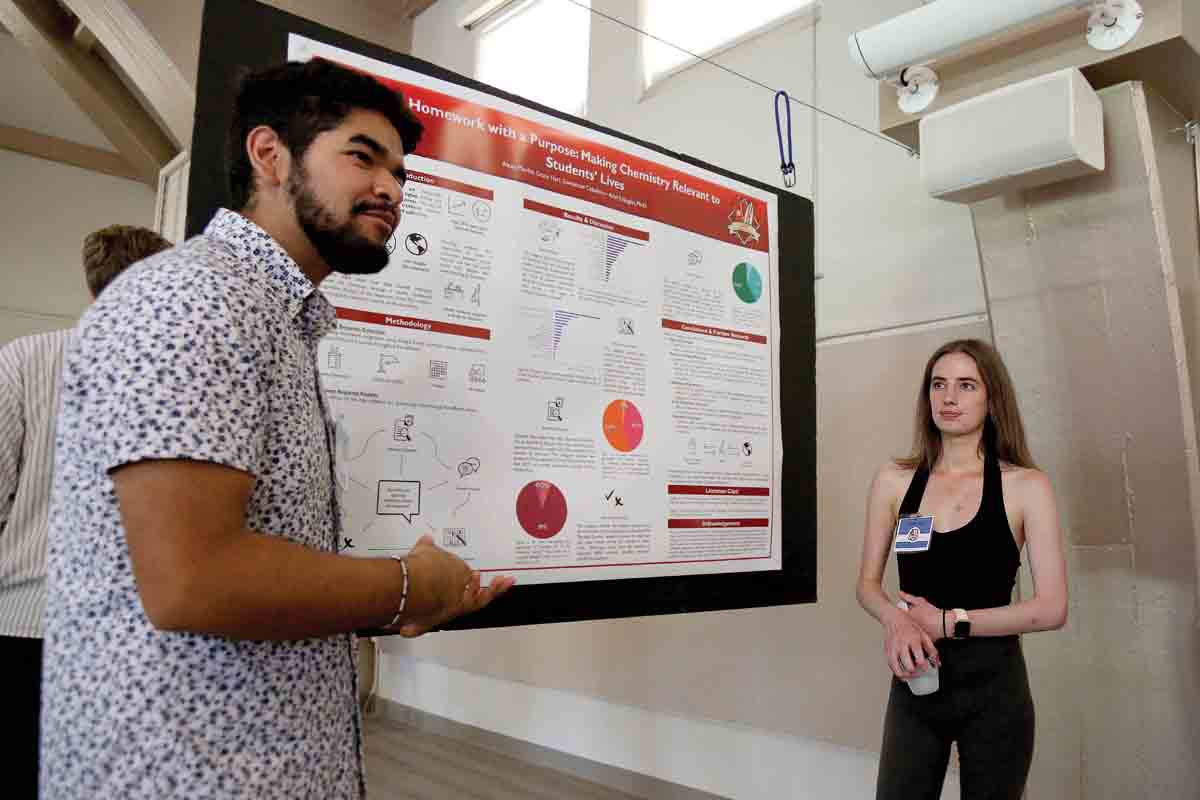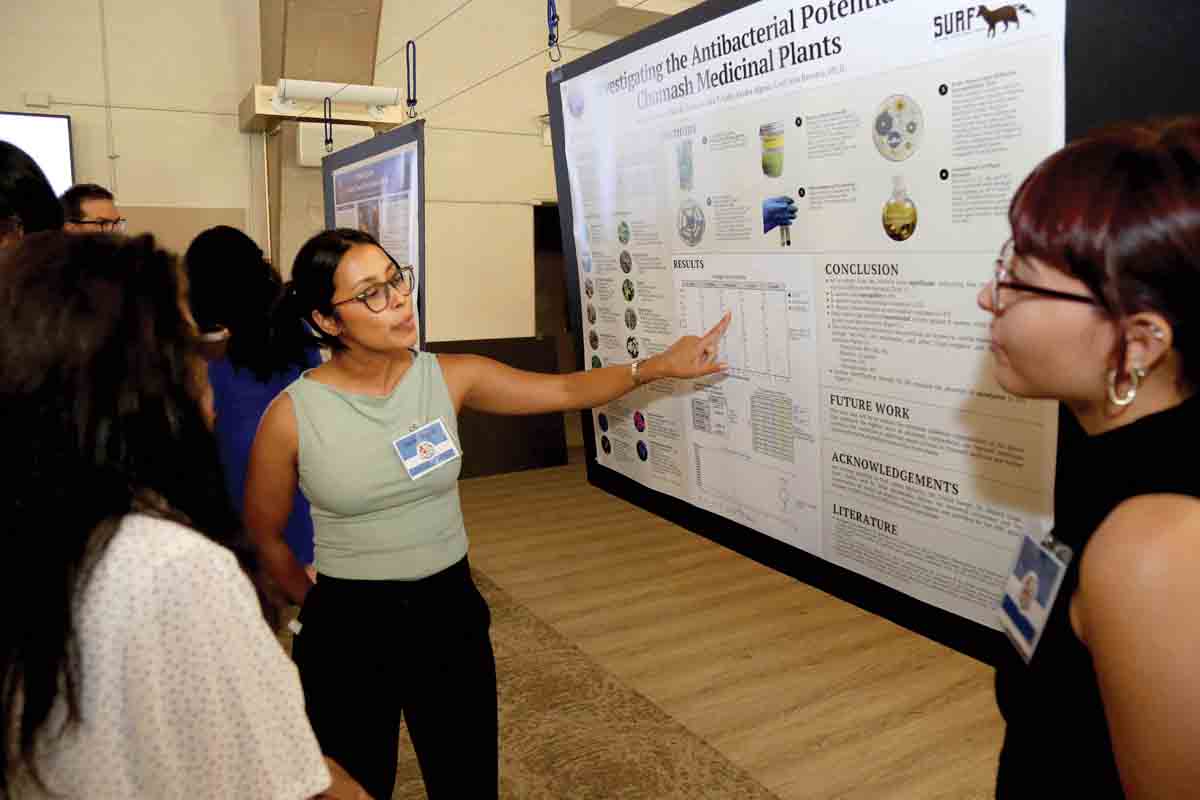
Student research in science, technology, engineering and mathematics earned CSUCI designations of leadership. Above: CSUCI students relate Chemistry to everyday life.
Since Cal State Channel Islands first welcomed students in the Fall of 2002, the University has steadily built a strong reputation for academic excellence by staying student-focused, community-driven and innovation-oriented.
By continuing to adapt to the evolving needs of students and employers, the University has positioned itself as a transformative force in higher education in California and beyond, said Provost Jessica Lavariega Monforti.
From its inception, the University has placed a strong emphasis on student-centered learning, interdisciplinary education, community service, and global engagement – and faculty-student research has been a core component of that mission, she added.
“While the University initially focused on providing high-quality undergraduate education with an emphasis on experiential learning, its commitment to research has expanded significantly over time,” Lavariega Monforti said.
In recent news, Cal State Channel Islands is one of just 33 institutions nationwide that earned both designations of Research Colleges & Universities (RCU) and Opportunity Colleges & Universities (OCU) from the American Council on Education (ACE) and the Carnegie Foundation for the Advancement of Teaching. These designations recognize CSUCI's leadership on two essential fronts: advancing science and discovery for the nation and prioritizing student access and success.
The University stands in good company with 216 RCU universities across the nation. Awardees spend at least $2.5 million on research on average in a single year, and this designation aims to acknowledge the growing research efforts for institutions that may not fit the criteria for a traditional “Research 1” (R1) status. With over $7 million in research expenditures last year alone, CSUCI's faculty and students are contributing meaningfully to scientific discovery, social progress, and regional development.
The OCU designation means that Cal State Channel Islands is among 479 of the nation’s model institutions of higher learning when it comes to helping students succeed and increase their socioeconomic standing. The designation is part of the newly developed Student Access and Earnings Classification, which measures universities on whether their student enrollment reflects the communities they serve and how graduates’ earnings compare to peers in their region.
“Hundreds of institutions nationwide are providing students an excellent opportunity to use higher education as a springboard to a better life,” said Ted Mitchell, president of ACE. “The Student Access and Earnings Classification highlights the depth and breadth of schools where student success is front and center.”
The Carnegie Classification of Institutions of Higher Education is viewed as a gold standard by policymakers, researchers and philanthropists when making decisions about various colleges and universities.
“Cal State Channel Islands’ recognition as an Opportunity College or University affirms what we know to be true: talent exists everywhere and it is our responsibility to nurture it, said Lavariega Monforti.
“It underscores our belief in the transformative power of education to change lives, strengthen communities and build a more just and prosperous future. These designations place our University among recognized research institutions, enhancing its reputation nationally and internationally,” said Lavariega Monforti.
Lavariega Monforti added that the designations also underscore the University’s commitment to expanding equitable access, fostering student success and empowering the next generation of leaders in our region and beyond.
Kristen Linton, Associate Professor of Health Science, called the designation “a powerful affirmation of the meaningful, mission-driven research, especially among undergraduates, taking place on campus.”
“What sets our University apart is how we leverage over $2.5 million in research funding not only to advance academic knowledge, but to deeply transform the lives of our students – particularly first-generation and historically underrepresented undergraduate students,” she said.
She added that for many faculty, through course-based undergraduate research experiences (CUREs), students gain authentic research training directly embedded in their coursework.
A recent study involving 115 students across four health science courses found that participation in CUREs led to statistically significant increases in students’ sense of belonging in engineering and technology fields — an essential factor in long-term STEM (science, technology, engineering and mathematics) retention.
“These gains were particularly impactful among students who had no prior exposure to research, Linton said.

Researcher Oasis Garcia explains the results of an investigative Chumash medicinal plants survey.
“Beyond the numbers, student stories illustrate the human impact of the University’s research mission. In their capstone presentations, seniors consistently credited their faculty-mentored research experiences as defining moments in their academic journeys.”
The campus has internal funding through the Research, Scholarship and Creative Activity (RSCA) program. The program supports faculty research, scholarships and creative activity with funds from the University’s Provost office and the CSU Office of the Chancellor.
“This support for faculty scholarship raises the visibility of the California State University as an institution that values faculty RSCA,” Saiqa Anne Qureshi, Interim Director of Research & Sponsored Programs.
The University won several key grants in the last year, including approximately $1 million, to recruit and train 27 scholars from diverse backgrounds through a three-semester program, from the U.S. Department of Education for Proyecto Special and Bilingual Educator Retention (SABER) to address the critical shortage of multilingual (Spanish and English) special education teachers in Ventura County. A $145,260 grant from the Ventura County Continuum of Care will support the Basic Needs Homeless Prevention program, to support housing-insecure students at risk of losing their housing within 14 days due to rent payment issues.
Furthermore, the University continues to build on work at the Santa Rosa Island Research Station with a marine debris removal project funded by the National Marine Sanctuary Foundation, focused on high-impact and large debris removal within the Channel Islands National Marine Sanctuary.
